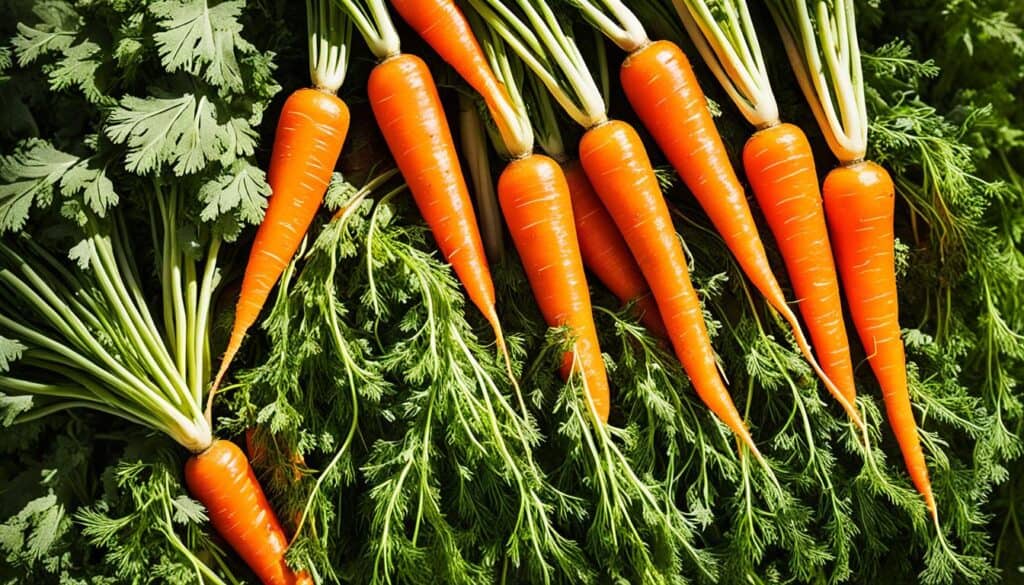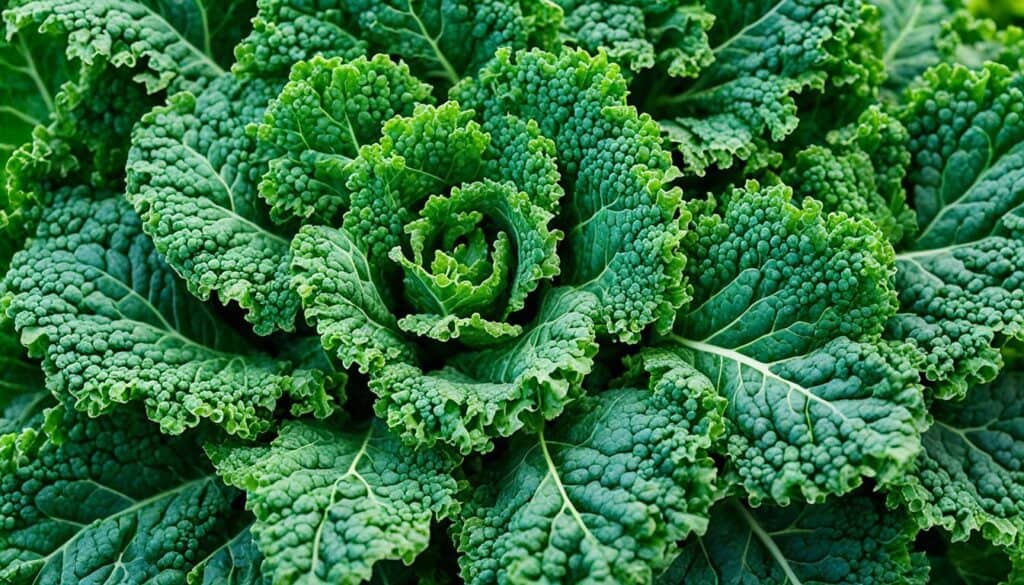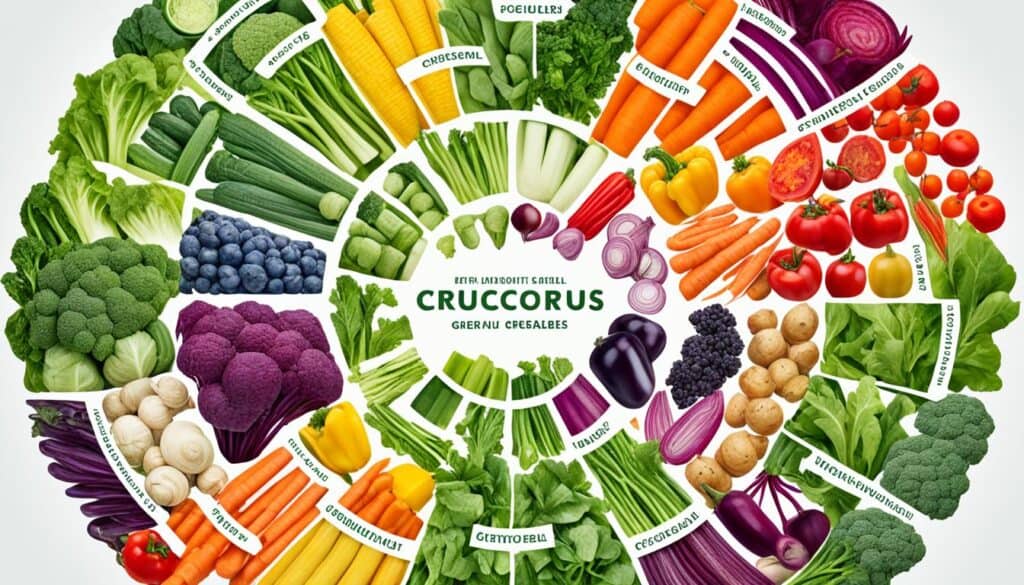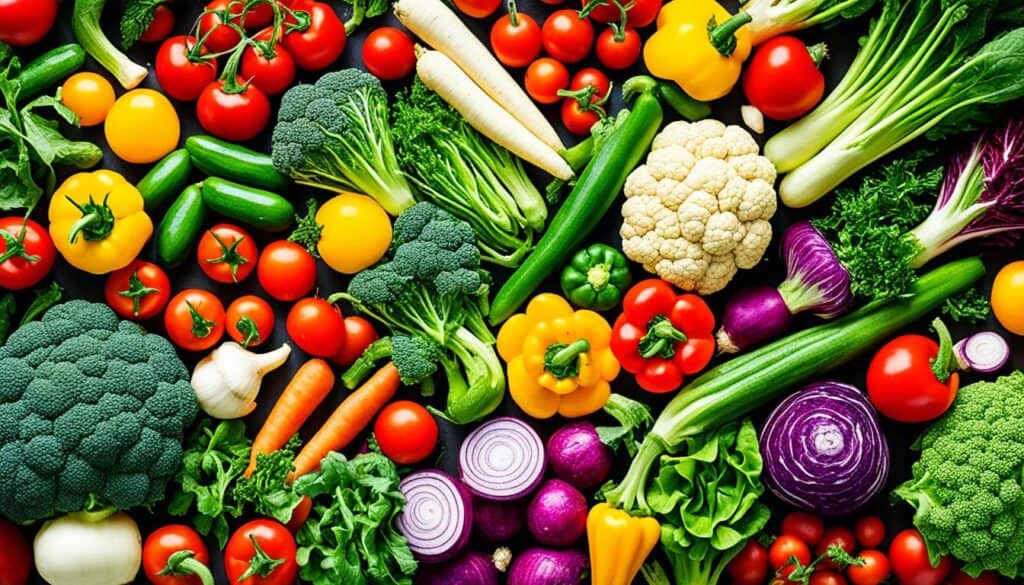When it comes to maintaining a healthy diet, incorporating the right vegetables is key. Not only are they packed with nutrients and antioxidants, but they also offer a range of health benefits. If you’re wondering which vegetables should be at the top of your grocery list, look no further. I’ve compiled a list of the best vegetables that you should be eating daily for optimal health.
Key Takeaways:
- Broccoli, cabbage, radish, carrots, Brussels sprouts, and kale are top-rated vegetables that you should consider adding to your daily diet.
- These vegetables are rich in nutrients, antioxidants, and fiber, making them excellent choices for promoting overall health.
- Including a variety of vegetables in your diet ensures that you receive a wide range of essential nutrients.
- Remember to consume vegetables in moderation and vary your choices to enjoy a balanced and nutritious diet.
- Stay tuned as we delve into the specific health benefits and versatility of each of these amazing vegetables.
Broccoli – A Versatile and Nutrient-Packed Vegetable
When it comes to healthy vegetables, broccoli is a true superstar. Not only is it delicious and versatile, but it also offers a plethora of nutrients that are essential for our overall well-being. Whether you enjoy it raw or cooked, this green vegetable packs a powerful punch of vitamins and minerals.
Broccoli is particularly rich in vitamin C, which is known for its immune-boosting properties. This essential vitamin helps support a healthy immune system, fight off infections, and protect against harmful free radicals. Additionally, vitamin C plays a crucial role in collagen production, promoting healthy skin and wound healing.
Another key nutrient found in broccoli is vitamin K, which is essential for blood clotting and bone health. Vitamin K helps facilitate the absorption of calcium, promoting strong and healthy bones. Including broccoli in your diet can be especially beneficial for individuals at risk of osteoporosis or bone fractures.
In addition to vitamins C and K, broccoli is an excellent source of dietary fiber. Fiber is known for its role in regulating digestion and promoting healthy bowel movements. It adds bulk to the stool, preventing constipation, and aiding in the removal of waste from the body.
One of the most notable compounds found in broccoli is sulforaphane. This naturally occurring compound is known for its cancer-preventative properties. It has been shown to have the ability to inhibit the growth of cancer cells and reduce inflammation in the body. Including broccoli in your diet can be a simple yet effective way to support your body’s natural defense against cancer.
Broccoli is not just a vegetable; it’s a powerhouse of nutrients that can have a significant impact on your health. From its high content of vitamins C and K to its cancer-preventative properties, broccoli is an excellent addition to any diet. So, go ahead and add this versatile and nutrient-packed vegetable to your next meal!
Cabbage – A Heart-Healthy and Low-Calorie Vegetable
Cabbage, a leafy green vegetable, offers a range of health benefits that make it a valuable addition to any diet. It is not only packed with essential vitamins and minerals, but also rich in antioxidants, folate, and fiber. Let’s explore why cabbage is considered a heart-healthy and low-calorie vegetable.
Rich in Vitamins C and K
One of the standout features of cabbage is its high content of vitamins C and K. Vitamin C is a potent antioxidant that helps boost the immune system and promotes collagen formation, which is crucial for maintaining healthy skin and connective tissues. Vitamin K plays a pivotal role in blood clotting and bone health.
“Cabbage is an excellent source of vitamins C and K, which play a vital role in maintaining proper immune function and healthy bones.”
Beneficial Antioxidants
The antioxidants found in cabbage help protect against oxidative stress, which can lead to chronic diseases such as heart disease, cancer, and inflammation. These antioxidants help neutralize harmful free radicals and reduce cellular damage, promoting overall health and well-being.
Low-Calorie and Weight-Friendly
If you’re watching your calorie intake or aiming for weight management, cabbage is an ideal choice. With its low-calorie content, it can be consumed in generous portions without significantly impacting your overall calorie intake. Additionally, cabbage contains fiber, which aids in digestion and promotes feelings of satiety.
Improves Cardiovascular Health
The combination of vitamins, minerals, and antioxidants in cabbage contributes to improved cardiovascular health. Research suggests that regular consumption of cabbage may help reduce the risk of heart disease by lowering cholesterol levels and improving blood pressure regulation.
“Including cabbage in your diet is a wise choice for maintaining heart health and reducing the risk of cardiovascular diseases.”
Enhances Cognitive Function
Studies have indicated that the presence of antioxidants and vitamins in cabbage may have positive effects on cognitive function. Regular consumption of cabbage, along with a balanced diet, may help improve memory, concentration, and overall brain health.
Image:
As you can see, cabbage is not just a versatile ingredient in various dishes, but also a powerhouse of nutrients. Its low-calorie nature, combined with its cardiovascular benefits and cognitive health support, make it an excellent choice for promoting overall well-being.
Radish – A Crunchy and Detoxifying Vegetable
When it comes to adding a refreshing crunch to your meals, look no further than radishes. These vibrant root vegetables are not only delicious but also offer a range of health benefits. Radishes are low in calories and fat, making them a guilt-free addition to any diet. But their nutritional value goes beyond being a low-calorie option. Radishes are packed with vitamins and minerals that contribute to overall well-being.
One of the standout features of radishes is their high vitamin content. They are an excellent source of vitamins C and B6, which are essential for supporting the immune system and maintaining overall health. Vitamin C is known for its antioxidant properties that help protect cells from damage caused by free radicals. Meanwhile, vitamin B6 plays a crucial role in brain development and function.
In addition to vitamins, radishes also provide important minerals like magnesium, potassium, and iron. These minerals are essential for maintaining proper bodily functions, including nerve signaling, muscle contraction, and oxygen transportation. Including radishes in your diet regularly can help ensure you meet your recommended daily intake of these vital minerals.
Furthermore, radishes are packed with antioxidants which help protect against cell damage and promote overall health. These antioxidants help combat inflammation, boost the immune system, and support proper cellular function. Additionally, radishes possess diuretic properties, which can aid in detoxification and promote healthy kidney function. This makes radishes an excellent choice for those looking to cleanse and rejuvenate their bodies.
Enjoying radishes is not limited to one culinary method. Whether eaten raw, cooked, or pickled, radishes add a unique and refreshing flavor to your dishes. Add them to salads for a crisp element or incorporate them into roasted vegetable medleys for added texture. You can even give pickled radishes a try for a tangy and refreshing twist.
Including radishes in your regular diet not only provides a delicious crunch but also ensures that you reap the benefits of their vitamins, minerals, antioxidants, and detoxification properties. So, why not add a touch of radish to your meals? Your body will thank you for it!
Carrots – A Nutrient-Rich and Vision-Boosting Vegetable
Carrots are a delicious and versatile vegetable that offer numerous health benefits. They are not only crunchy and satisfying but also packed with essential nutrients to support overall well-being.
One of the key nutritional benefits of carrots is their high content of vitamins A and C. Vitamin A is crucial for maintaining good vision, while vitamin C supports a strong immune system. By adding carrots to your daily diet, you can naturally boost your intake of these vital vitamins.
In addition to vitamins, carrots are also rich in potassium and fiber. Potassium is essential for maintaining a healthy balance of fluids in the body and supporting proper muscle and nerve function. Meanwhile, fiber helps promote healthy digestion and can aid in weight management.
Moreover, carrots contain a powerful antioxidant known as beta carotene. Beta carotene is converted into vitamin A in the body and is essential for maintaining healthy vision. It protects the eyes from oxidative stress and may reduce the risk of age-related macular degeneration and cataracts.
Carrots and Vision Health
The vision-boosting properties of carrots are well-known. The high levels of vitamin A and beta carotene in carrots make them excellent for maintaining eye health. Whether you have perfect vision or wear glasses, incorporating carrots into your diet can help support optimal eye function.
Interestingly, consuming a diet rich in beta carotene has been linked to a reduced risk of night blindness. Night blindness is a condition in which it becomes difficult to see in low light conditions. By including carrots in your meals, you can actively support your vision and protect against potential vision problems.
Carrots and Immune System Support
Carrots are not just beneficial for your vision; they can also boost your immune system. The combination of vitamins A and C found in carrots enhances the body’s ability to fight off infections, viruses, and bacteria.
Vitamin A plays a vital role in maintaining the integrity of the skin and mucous membranes, which are the body’s first line of defense against pathogens. Meanwhile, vitamin C supports the production of white blood cells, which help combat and prevent illness.
By enjoying carrots regularly, you can fortify your immune system and promote overall wellness.
Carrots are incredibly versatile and can be enjoyed in various ways. Whether you prefer them raw, cooked, or juiced, carrots add a delightful crunch to salads, stir-fries, soups, and even desserts. Their vibrant orange color makes them visually appealing and a beautiful addition to any dish.
Including carrots in your daily diet is a simple and delicious way to enhance your health. Whether you’re looking to boost your vision or strengthen your immune system, carrots offer a winning combination of vitamins, minerals, and antioxidants to support your overall well-being.
Brussels Sprouts – An Immune-Boosting and Digestive-Healthy Vegetable
When it comes to supercharged vegetables, Brussels sprouts definitely top the list. These tiny green powerhouses are packed with essential nutrients that promote a healthy immune system and support optimal digestion.
Brussels sprouts are a rich source of vitamins C and K, which play crucial roles in immune function and blood clotting. Vitamin C is known for its antioxidant properties, protecting cells against damage and supporting the body’s defense against infections.
But it doesn’t stop there. Brussels sprouts are also a great source of fiber, which aids in digestion and helps keep the digestive system running smoothly. Fiber adds bulk to the stool, promoting regular bowel movements and preventing constipation.
These mighty sprouts are also packed with antioxidants, which help fight harmful free radicals in the body and reduce inflammation. Antioxidants play a vital role in maintaining overall health and protecting against chronic diseases, including heart disease and certain types of cancer.
One of the best things about Brussels sprouts is their versatility. You can enjoy them roasted to bring out their natural sweetness, sautéed with garlic for a flavorful side dish, or even added to salads for a crunchy texture. Let your taste buds guide you in exploring the many delicious ways to incorporate Brussels sprouts into your meals.
Benefits of Brussels Sprouts:
- Boosts the immune system with vitamins C and K
- Supports healthy digestion with fiber
- Provides antioxidants for overall health
- Provides essential nutrients for a well-rounded diet
Next time you’re at the supermarket, don’t forget to grab a bag of Brussels sprouts. These tiny greens are nutritional powerhouses that can help strengthen your immune system and keep your digestive system in check.
| Nutrients | Amount per 1 cup (156g) |
|---|---|
| Vitamin C | 124% of the Daily Value (DV) |
| Vitamin K | 274% of the DV |
| Fiber | 4 grams |
| Antioxidants | Various types |
Kale – A Nutrient-Dense and Versatile Leafy Green
Incorporating kale into your diet can provide a wide range of health benefits. This leafy green is not only packed with vitamins and minerals but also offers versatility in various dishes. Let’s explore the nutritional value and the different ways you can enjoy this powerhouse vegetable.
The Nutritional Powerhouse of Kale
Kale is a great source of essential vitamins and minerals that contribute to overall well-being. Here’s a breakdown of its nutrient content:
| Vitamins | Minerals | Others |
|---|---|---|
|
|
|
Including kale in your meals allows you to harness these essential nutrients, promoting a well-rounded and balanced diet.
Enjoying Kale in Various Dishes
Kale can be enjoyed both raw and cooked, giving you options to incorporate it into your meals in different ways:
- Raw in Salads: Add kale leaves to your salads for a fresh and nutritious twist. Its hearty texture and slightly bitter taste complement other vegetables and dressings.
- Sautéed or Stir-Fried: Lightly cooking kale in a pan with some olive oil and seasoning brings out its flavor and reduces the bitterness. Sautéed kale can be enjoyed as a side dish or added to stir-fries.
- Blended in Smoothies: Blend kale leaves into your favorite smoothie recipes for an added nutritional boost. It pairs well with fruits like bananas and berries, creating a vibrant and nutritious blend.
- Baked as Crispy Chips: Transform kale leaves into crispy chips by baking them in the oven. This healthy snack option satisfies cravings while providing an abundance of vitamins and minerals.
Regardless of how you choose to enjoy kale, it’s important to wash the leaves thoroughly and remove any tough stems before consumption.
“Kale is truly a nutritional powerhouse that offers a myriad of health benefits when incorporated into a balanced diet.” – Nutritionist Jane Smith
So, whether you are looking to boost your vitamin intake, increase fiber consumption, or add more antioxidants to your meals, kale is an excellent choice. Its nutrient density and versatility make it a valuable addition to any diet.
Other Nutrient-Dense Vegetables to Consider
In addition to the six highlighted vegetables, there are many other nutrient-dense options to consider. Including a variety of these vegetables in your diet ensures a range of nutrients and flavors. Here are some of the best vegetables you can add to your healthy veggie lineup:
1. Green Banana
Green bananas are nutrient-dense and packed with beneficial vitamins and minerals. They are a great source of dietary fiber, which aids in digestion and promotes a healthy gut. Green bananas also contain resistant starch, a type of carbohydrate that can help regulate blood sugar levels and promote weight loss.
2. Golden Beets
Golden beets are another healthy veggie option that provides a unique and vibrant twist to your meals. They are rich in antioxidants and contain essential nutrients like folate, manganese, and vitamin C. Golden beets can help support a healthy immune system and promote detoxification.
3. Garlic
Garlic not only adds a delicious flavor to your dishes but also offers numerous health benefits. It contains a compound called allicin, which has been shown to have anti-inflammatory and immune-boosting properties. Garlic is also rich in antioxidants that can help protect against oxidative stress and reduce the risk of chronic diseases.
4. Mushrooms
Mushrooms are a versatile and nutrient-packed vegetable that can be enjoyed in a variety of dishes. They are low in calories and a good source of vitamins, minerals, and antioxidants. Mushrooms also contain a unique compound called ergothioneine, which acts as a powerful antioxidant and may have protective effects on the body.
5. Turnips
Turnips are root vegetables that are not only delicious but also nutrient-dense. They are a good source of vitamins C and K, as well as fiber and minerals like potassium and calcium. Turnips offer a range of health benefits, including improved digestion, enhanced immune function, and support for healthy bones.
6. Bell Peppers
Bell peppers come in various colors and are known for their vibrant flavor and crunchy texture. They are rich in vitamin C, which supports a healthy immune system and collagen production. Bell peppers also contain antioxidants that can help reduce inflammation and protect against chronic diseases.
7. Asparagus
Asparagus is a nutrient-dense vegetable packed with vitamins A, C, and K, as well as folate and fiber. It is known for its natural diuretic properties, which can help flush out excess water and toxins from the body. Asparagus also contains antioxidants that can support overall health and may have anti-aging effects.
8. Cauliflower
Cauliflower is a versatile vegetable that can be used as a low-carb substitute for traditional starches. It is a good source of fiber, vitamins C and K, and antioxidants. Cauliflower also contains compounds that may have anti-cancer effects and promote heart health.
9. Green Beans
Green beans, also known as string beans or snap beans, are nutrient-dense and low in calories. They are rich in vitamins A, C, and K, as well as minerals like potassium and folate. Green beans are a good source of fiber and antioxidants, making them an excellent addition to a healthy diet.
10. Beets
Beets are a versatile root vegetable that offers numerous health benefits. They are rich in antioxidants, vitamins, and minerals, including folate, manganese, and potassium. Consuming beets may help support cardiovascular health, improve exercise performance, and enhance brain function.
Incorporating these nutrient-dense vegetables into your meals not only adds variety to your diet but also ensures you are getting a wide range of vitamins, minerals, and antioxidant benefits.
The Importance of Moderation and Variety
While vegetables are essential for a healthy diet, it’s important to consume them in moderation and include a variety of options. Eating too many vegetables can have negative consequences, so finding the right balance is key. Aim for a diverse selection of vegetables to ensure you are getting a range of nutrients.
When it comes to a balanced diet, moderation means enjoying vegetables in appropriate quantities, alongside other food groups, such as protein, grains, and healthy fats. Yes, vegetables are packed with beneficial vitamins, minerals, and antioxidants, but consuming excessive amounts can lead to unpleasant digestive issues and even nutrient imbalances. By practicing moderation, you can savor the benefits of vegetables without overwhelming your system.
Additionally, including a variety of vegetables in your daily meals is crucial for reaping their full nutritional benefits. Each vegetable offers its unique combination of vitamins, minerals, and phytonutrients. By incorporating a wide range of veggies into your diet, you can ensure that you are receiving a comprehensive array of health-promoting nutrients.
Here are a few easy ways to introduce variety into your vegetable intake:
- Try a new vegetable each week. Experimenting with different produce not only adds excitement to your meals but also exposes you to a wider spectrum of nutrients.
- Explore different cooking methods. Vegetables can be enjoyed raw, steamed, roasted, sautéed, or grilled. Experimenting with diverse cooking techniques can transform the taste and texture of vegetables, making them more enjoyable.
- Participate in seasonal eating. Embrace the changing seasons and take advantage of the fresh produce available during specific times of the year. This not only adds variety to your diet but also supports local farmers and reduces environmental impact.
“The secret to a vibrant and nutrient-rich diet is striking a balance between moderation and variety. By listening to your body’s needs and enjoying a diverse selection of vegetables, you can nourish yourself with wholesome, delicious meals every day.” –
Remember, achieving a healthy diet is not about restriction or single-minded focus on a few “superfoods.” Instead, it’s about cultivating a lifestyle that prioritizes nourishment, enjoyment, and sustainability. So, embrace moderation and savor the variety that the world of vegetables has to offer.
Examples of Moderation and Variety in Vegetable Consumption
| Vegetable | Serving Size |
|---|---|
| Broccoli | 1 cup (91g) |
| Cabbage | 1 cup (89g) |
| Radish | 1 cup (116g) |
| Carrots | 1 medium carrot (61g) |
| Brussels Sprouts | 1 cup (156g) |
| Kale | 1 cup (67g) |
Recommended Amount of Vegetables per Serving
The amount of vegetables you should eat in a single serving can vary depending on factors like your dietary needs and personal preference. However, experts generally recommend consuming at least half a cup to two cups of vegetables per person per serving. The key is to focus on incorporating a variety of vegetables into your meals to ensure you receive a wide range of nutrients.
By including a diverse selection of vegetables, you can benefit from the unique vitamins, minerals, and antioxidants each type offers. Eating a variety of vegetables also adds flavor and texture to your meals, making them more enjoyable and satisfying.
Listen to your body’s needs and adjust the serving sizes of vegetables accordingly. If you feel you need more or less, trust your instincts and make the necessary adjustments.
| Vegetable | Serving Size |
|---|---|
| Broccoli | 1 cup |
| Cabbage | 1 cup, shredded |
| Radish | 1 cup, sliced |
| Carrots | 1 medium carrot |
| Brussels Sprouts | 1 cup |
| Kale | 1 cup, chopped |
Note: Serving sizes may vary for different vegetables. It’s important to refer to specific nutritional guidelines for accurate information.
Remember, the goal is to create a balanced and nutritious meal by including a wide variety of vegetables. Embrace the colorful array of nature’s bounty and reap the benefits of a well-rounded and healthy diet.
Conclusion
Incorporating the best vegetables into your daily diet is essential for promoting optimal health. Broccoli, cabbage, radish, carrots, Brussels sprouts, and kale are my top picks due to their rich nutrient content and numerous health benefits. These vegetables are packed with vitamins, minerals, antioxidants, and fiber that support overall well-being.
However, it is essential to consume vegetables in moderation and embrace variety. While these vegetables offer incredible health benefits, it is crucial not to overindulge. Maintaining a balanced diet is about finding the right balance between consuming vegetables and other food groups.
By varying your vegetable choices, you can enjoy a wider range of nutrients, flavors, and textures. Including different vegetables in your diet not only provides an array of vitamins and minerals but also keeps your meals exciting and satisfying. Try experimenting with new vegetables or incorporating them into your favorite dishes to add a touch of freshness and nutrition.
To achieve a healthy lifestyle, remember to prioritize vegetables as a fundamental part of your diet. Incorporating the best vegetables, practicing moderation, and embracing variety will pave the way to a balanced and nutritious eating plan that supports your overall well-being.










Leave a Reply